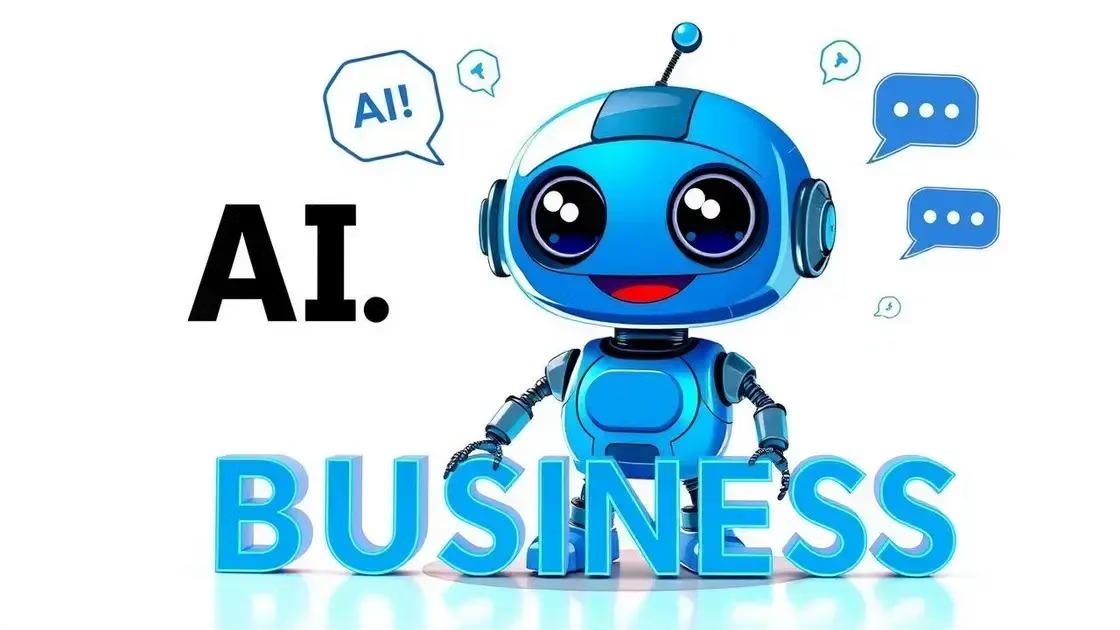Artificial Intelligence (AI) significantly enhances business productivity by automating repetitive tasks, optimizing workflows, and enabling smarter resource management. It revolutionizes decision-making through rapid data analysis and accurate forecasting, allowing companies to predict trends and mitigate risks. Furthermore, AI transforms the customer experience by offering personalized interactions, providing 24/7 support via chatbots, and facilitating proactive service based on insightful feedback, ultimately fostering stronger customer relationships and driving growth.
Artificial Intelligence is revolutionizing the way businesses operate, boosting productivity and enhancing customer interactions. In our modern landscape, AI enables companies to streamline processes, analyze vast amounts of data, and offer tailored experiences. Curious about how this technology can reshape your business dynamics? Keep reading!
Higher Productivity with AI
Many businesses today are looking for ways to get more done with less effort. This is where Artificial Intelligence, or AI, comes in. AI helps companies work smarter, not just harder. It takes over tasks that used to take a lot of time. This means people can focus on more important things. Think of AI as a very smart helper that never gets tired.
Automating Daily Tasks
One of the biggest ways AI boosts productivity is by automating daily tasks. Imagine all the small, repetitive jobs that fill up a workday. Things like entering data into spreadsheets, sorting through emails, or scheduling meetings. These tasks can be boring and take a lot of time. AI systems can do these jobs much faster and with fewer mistakes. For example, a business might use AI to automatically process invoices. This frees up staff who used to do this by hand. They can now spend their time on tasks that need human creativity or problem-solving. This shift makes the whole team more productive.
Another common example is customer service. AI-powered chatbots can answer common questions from customers around the clock. This means customers get quick help, and human agents are free to handle more complex issues. This improves service quality and makes the support team more efficient. It’s like having an extra team member who works 24/7 without needing a break. This kind of automation is a game-changer for many companies, big or small. It helps them handle more work without adding more people.
Even in areas like human resources, AI can help. It can sort through job applications, schedule interviews, and even help with onboarding new employees. This speeds up the hiring process and makes sure the best candidates are found quickly. By taking over these routine tasks, AI allows businesses to use their human talent more effectively. This leads to a noticeable increase in overall productivity across different departments.
Smarter Decisions with Data
AI also helps businesses make better decisions. It can look at huge amounts of data very quickly. Humans would take days or weeks to do the same. AI can spot patterns and trends that people might miss. For instance, AI can analyze sales data to predict what products customers will want next. This helps businesses stock the right items and avoid waste. It also helps them create marketing campaigns that really hit the mark. When decisions are based on solid data, they are usually better decisions.
Think about financial planning. AI can analyze market trends and financial reports to give insights into where a company should invest. It can also help identify risks before they become big problems. This kind of predictive power is invaluable. It allows leaders to steer their company in the right direction with more confidence. This leads to more efficient use of resources and better outcomes. Businesses that use AI for data analysis often find they can react faster to changes in the market. This gives them a real edge over competitors.
For example, in manufacturing, AI can monitor production lines. It can predict when a machine might break down. This allows for maintenance to be done before a costly stoppage occurs. This proactive approach saves money and keeps production running smoothly. This is a clear example of how AI not only boosts productivity but also prevents losses. It helps companies avoid costly mistakes by providing timely, accurate information.
Optimizing Workflows and Resources
Beyond automating tasks, AI can optimize entire workflows. It can look at how work flows through a company and find bottlenecks. A bottleneck is a point where work slows down. AI can then suggest ways to make the process smoother and faster. This might involve rearranging steps or reassigning tasks. For example, in logistics, AI can plan the most efficient delivery routes. This saves fuel and time, making the delivery process much more productive.
Resource management is another area where AI shines. It can help businesses use their resources, like staff, equipment, and materials, in the best possible way. AI can predict demand for products or services. This helps companies allocate their resources precisely. They won’t have too much or too little of what they need. This reduces waste and ensures that everything is used efficiently. For instance, a hospital might use AI to optimize staff schedules. This ensures there are enough nurses and doctors at all times, without overstaffing.
AI can also help with quality control. In factories, AI-powered cameras can spot defects in products much faster and more accurately than human eyes. This ensures that only high-quality items leave the production line. This not only improves product quality but also reduces rework and waste. By making processes more efficient and reducing errors, AI directly contributes to higher productivity. It helps businesses get more value from every hour worked and every resource used.
In summary, AI is a powerful tool for boosting productivity. It automates routine tasks, helps make smarter decisions, and optimizes how work gets done. Businesses that embrace AI can expect to see significant improvements in their efficiency and overall output. It’s about working smarter, not harder, and AI makes that possible for everyone.
Rapid Data Analysis and Forecasting Techniques
In today’s fast-paced business world, getting information quickly is key. This is where rapid data analysis comes in. Businesses collect huge amounts of data every day. This data can tell them a lot about their customers, sales, and even what might happen in the future. But looking through all that data by hand would take forever. That’s why many companies are turning to Artificial Intelligence, or AI, to help them. AI can sort through data much faster than any human. It helps businesses make smart choices quickly.
Getting Insights in Real-Time
One big benefit of AI is that it helps businesses get insights in real-time. This means they can see what’s happening right now, not just what happened last week or last month. Imagine a store that sells clothes. With AI, they can see which items are selling well at this very moment. They can also see if a certain marketing campaign is working right away. This allows them to make quick changes. If a product isn’t selling, they can adjust its price or promote it differently. This immediate feedback helps businesses stay ahead. It means they can react to changes in the market much faster than before. This quick response can save money and help them make more sales. It’s like having a crystal ball that shows you what’s happening as it happens.
AI tools can also monitor customer behavior on websites or apps. They can see what customers click on, what they search for, and how long they stay on a page. This information is very valuable. It helps businesses understand what their customers like and don’t like. For example, if many people leave a certain page quickly, AI can flag that. The business can then look at that page and figure out why it’s not working. This constant monitoring and analysis help businesses improve their online presence. It makes sure they are always offering what their customers want. This leads to happier customers and more business. Real-time insights are a game-changer for modern companies.
Furthermore, AI can help with fraud detection. Banks and credit card companies use AI to spot unusual transactions right away. If someone tries to use a stolen card, the AI can flag it almost instantly. This prevents financial losses and protects customers. This kind of immediate analysis is crucial in many industries. It shows how AI isn’t just about making more money, but also about keeping things safe and secure. The speed of AI in processing data is truly remarkable and offers many practical uses.
Predicting the Future with Forecasting
Beyond looking at what’s happening now, AI is also great at forecasting. Forecasting means predicting what will happen in the future. AI uses past data to make educated guesses about future trends. For example, a company can use AI to predict how many products they will sell next month. This helps them plan their production. They won’t make too many products that won’t sell, and they won’t run out of popular items. This saves money and keeps customers happy. Accurate forecasts are very important for good business planning.
AI can also predict market trends. It can look at economic data, news, and even social media conversations. By analyzing all this information, AI can guess what new products or services might become popular. This helps businesses innovate and create things that people will want. It gives them a head start on their competitors. Imagine knowing what the next big thing will be before anyone else. That’s the power of AI forecasting. It helps businesses stay relevant and grow.
For example, in agriculture, AI can forecast crop yields. It looks at weather patterns, soil conditions, and past harvest data. Farmers can then know how much food they expect to grow. This helps them plan for storage and sales. In healthcare, AI can predict disease outbreaks. It analyzes public health data and environmental factors. This helps hospitals prepare and allocate resources. These are just a few ways AI’s forecasting abilities help different sectors plan better and avoid problems. It’s about being prepared for what’s coming.
Improving Business Strategies
When businesses can analyze data quickly and forecast accurately, they can make much better strategies. AI helps them see the big picture and also the small details. They can understand what works and what doesn’t. This leads to smarter marketing campaigns. They can target the right customers with the right message. It also helps them improve their products and services. They can see what customers are complaining about and fix it quickly. This constant improvement keeps businesses competitive.
AI also helps with risk management. It can identify potential problems before they become serious. For example, AI can analyze financial data to spot signs of a downturn. This allows businesses to take steps to protect themselves. They can adjust their spending or look for new income sources. This proactive approach is much better than reacting after a problem has already hit. It gives businesses more control over their future.
In conclusion, rapid data analysis and forecasting techniques powered by AI are changing how businesses operate. They provide quick insights, help predict future events, and lead to smarter business strategies. Companies that use AI in this way are better prepared for challenges and more likely to succeed. It’s about using information to your advantage, and AI makes that easier than ever before.
Enhancing Customer Experience through AI Solutions
Making customers happy is super important for any business. When customers have a good experience, they come back. They also tell their friends about your business. Today, many companies are using Artificial Intelligence, or AI, to make customer experiences even better. AI helps businesses understand what customers need and want. It also helps them give faster and more personal service. This makes customers feel valued and understood. It’s like having a super smart helper for every customer, available whenever they need it. This modern approach is changing how businesses connect with people.
Personalized Experiences for Every Customer
Imagine walking into a store where the staff knows exactly what you like. They suggest things you’d love, even before you ask. AI can do this for online businesses, but on a much larger scale. It looks at what customers have bought before. It also sees what they’ve looked at on a website, how long they stayed on a page, and even what they searched for. Then, it uses all this information to suggest products or services they might truly like. This is called personalization. It makes shopping feel special and tailored just for you. For example, if you often buy running shoes, AI might show you new running gear, special offers on athletic wear, or even articles about improving your running technique. This makes it easier for you to find what you need. It also makes you feel like the business really gets you and understands your interests, which builds a stronger connection.
Personalization goes beyond just product suggestions. AI can also tailor the messages customers receive. This means emails, ads, or even notifications can be made just for them. If a customer often buys pet supplies, they might get emails about new pet toys, food discounts, or tips for pet care. If they live in a certain area, they might get ads for local store events or special promotions only available near them. This makes marketing much more effective and less like spam. Customers are much more likely to open messages that feel relevant and helpful to them. This helps build a stronger, more meaningful relationship between the customer and the brand. It shows customers that the business pays attention to their unique preferences and tries to add value to their lives.
Think about popular streaming services like Netflix or Spotify. They use powerful AI algorithms to suggest movies, shows, or songs you might enjoy. They learn from what you watch, what you skip, what you listen to repeatedly, and even what time of day you use their service. This makes your entertainment experience much more enjoyable and effortless. You spend less time searching for something to watch or listen to and more time simply enjoying. Businesses can use similar AI tools to personalize their websites and apps. They can show different content, different layouts, or different offers to different visitors based on their past behavior and likely interests. This makes the website feel more welcoming, intuitive, and useful for everyone. It’s all about making each customer feel like they are getting a one-of-a-kind service that truly understands their individual needs and desires.
Even in sectors like banking and finance, AI helps personalize services. It can analyze a customer’s spending habits, income, and financial goals. Then, it can offer tailored advice on saving money, managing budgets, or even suggest suitable investment options. This kind of personalized financial guidance can be incredibly helpful for customers trying to improve their financial health. It shows customers that their bank cares about their financial well-being, not just their transactions. This builds deep trust and long-lasting loyalty. Personalized experiences make customers feel special and understood. They also make them much more likely to stick with a business for a long time, becoming repeat customers and even advocates for the brand.
For online learning platforms, AI can adapt the entire learning path for each student. It can see where a student struggles with certain topics or excels in others. Then, it can suggest extra practice exercises, different explanations, or more advanced topics to challenge them. This ensures that each student learns at their own pace and gets the support they need to succeed. It makes the learning experience more effective, engaging, and less frustrating. This level of customization was very hard, almost impossible, to achieve before AI became widely available. Now, it’s becoming a standard expectation for many digital services. Businesses that embrace this deep level of personalization will definitely stand out in a crowded market and win over customers who crave unique, relevant interactions.
In summary, AI-driven personalization is about understanding each customer deeply and individually. It’s about using that understanding to create unique and relevant experiences across all touchpoints. This leads to significantly higher customer satisfaction, stronger emotional connections, and ultimately, unwavering customer loyalty. It transforms a generic, one-size-fits-all interaction into a meaningful, memorable connection. This is a powerful way to truly enhance the overall customer experience, making customers feel truly seen, heard, and valued by the business they choose to interact with.
24/7 Support with AI Chatbots
Have you ever needed help from a company late at night or on a weekend, only to find their customer service lines closed? It can be incredibly frustrating when no one is available to answer your urgent questions. This is where AI chatbots come in handy. Chatbots are clever computer programs that can talk to customers through text or even voice. They can answer common questions, guide customers through processes, and even help with simple tasks like checking an order status or updating account information. The best part is, they can do all of this 24 hours a day, 7 days a week, without needing breaks or sleep. This means customers can get instant help whenever they need it, no matter the time zone or holiday. This constant availability greatly improves the customer experience. It removes the frustration of waiting for business hours and provides immediate solutions.
Chatbots are designed to handle a very large number of customer requests at the same time. This means customers don’t have to wait in long phone queues or on hold for extended periods. They get instant responses, which is a huge plus in today’s fast-paced world. For example, if a customer wants to know their order status, a chatbot can provide it right away by accessing the order database. If they need to reset a password, the chatbot can guide them through the secure steps. This speed and efficiency make customers happy because their issues are resolved quickly. It also frees up human customer service agents to handle more complex, sensitive, or unique issues that require human empathy and problem-solving skills. This makes the whole support team more efficient and allows them to focus on higher-value tasks, improving overall service quality.
Many modern chatbots are designed to sound friendly and helpful, making the conversation feel more natural. They can understand natural language, so you don’t have to type in special commands or keywords. You can just ask your question like you would to a person. While they are incredibly good at handling routine inquiries and frequently asked questions, they know their limits. If a chatbot encounters a question it can’t answer or a problem that’s too complex, it can often seamlessly transfer the customer to a live human agent. This ensures that customers always get the help they need, even for tricky situations. It creates a smooth hand-off, so the customer doesn’t have to repeat themselves or start over. This seamless transition is key to a good customer experience, preventing frustration and ensuring resolution.
Beyond just answering questions, some advanced chatbots can also help with sales and lead generation. They can guide customers through product choices by asking a series of qualifying questions. They can even help complete a purchase by directing customers to the right product pages or checkout. This makes the buying process easier and more convenient for the customer. For instance, a chatbot on a travel website might help you find the best flight deals or hotel bookings. It can ask about your travel dates, destination, budget, and preferences. Then, it can show you options that fit your needs perfectly. This adds a layer of convenience and acts like a personalized shopping assistant, enhancing the overall buying journey.
Chatbots also collect incredibly valuable data from every conversation they have. This data can be analyzed to understand what questions customers ask most often, what problems they face repeatedly, and what information they struggle to find. This helps businesses understand common pain points and areas for improvement. This is called conversational analytics. This information can then be used to improve products, services, website content, or even the chatbot itself. It’s a continuous learning process. The more data the chatbot processes, the smarter and more effective it becomes at serving customers. This feedback loop is crucial for ongoing improvement in customer service operations. It ensures that the business is always getting better at meeting customer needs and expectations.
In conclusion, AI chatbots are a powerful and essential tool for enhancing customer experience in the digital age. They provide instant, 24/7 support, significantly reduce customer wait times, and efficiently handle a vast volume of routine tasks. This frees up valuable human agents for more complex and empathetic interactions. They also offer a convenient and accessible way for customers to get help and information anytime, anywhere. By wisely using chatbots, businesses can ensure that their customers always feel supported, heard, and valued, leading to much higher satisfaction rates and stronger, more lasting customer loyalty. They are truly transforming the landscape of customer support.
Proactive Customer Service and Feedback
Good customer service isn’t just about reacting to problems after they happen. It’s also about being proactive. This means anticipating what customers might need or what problems they might face before they even realize it themselves. Artificial Intelligence is exceptionally good at this. It can analyze vast amounts of customer data, looking for patterns and subtle clues that might indicate a potential issue. For example, if a customer’s internet usage suddenly drops significantly, or if their device shows unusual activity, AI might flag it. The internet provider could then reach out to check if there’s a problem with their service or equipment, offering help before the customer even calls. This kind of proactive help makes customers feel truly cared for and valued. It shows that the business is looking out for them, not just waiting for them to complain or cancel their service.
AI also helps businesses gather and understand customer feedback much more effectively and efficiently. Customers often leave reviews on websites, post comments on social media, send emails, or fill out surveys. This generates an enormous amount of unstructured information that is difficult for humans to process manually. AI tools can quickly read, analyze, and understand the sentiment or overall mood of these texts. They can figure out if customers are happy, unhappy, or neutral. What are the most common complaints? What are the most frequent praises? This is called sentiment analysis and topic modeling. It helps businesses quickly grasp the overall sentiment and key themes from thousands of pieces of feedback. They can then use this information to make targeted improvements to their products, services, or operations. This ensures that customer voices are not only heard but also acted upon in a timely manner.
Imagine a large retail chain with hundreds of stores. AI can analyze thousands of online reviews and social media mentions about different store locations. It might quickly find that many customers mention long checkout lines or unhelpful staff at a particular store in a specific city. The retail management can then address this specific issue at that location, perhaps by scheduling more staff during peak hours or providing additional training. This is much faster and more accurate than trying to read every single review manually. It allows businesses to pinpoint problems with precision and fix them quickly, often before they become widespread issues. This responsiveness builds immense trust and shows customers that their opinions truly matter and lead to tangible changes. It transforms raw, messy feedback into clear, actionable insights, driving continuous improvement across the entire organization.
AI can also help businesses reach out to customers with relevant information at precisely the right time. For instance, if a customer just bought a new smart home appliance, AI might automatically send them a helpful guide on how to set it up, common troubleshooting tips, or even suggestions for compatible accessories. Or, if a subscription service is about to expire, AI can send a timely reminder with options to renew or upgrade. These timely, relevant communications are incredibly helpful and can prevent potential issues or frustrations. They show that the business is thinking ahead and providing value beyond the initial purchase. This kind of thoughtful, well-timed interaction makes the customer experience smoother and more pleasant. It’s about adding value at every step of the customer journey, not just when a problem arises.
Another powerful way AI enhances proactive service is by predicting customer churn. Churn means when customers stop using a service or buying from a business, often moving to a competitor. AI can look at a customer’s past behavior, their engagement levels, their support interactions, and even their demographic information. Based on these patterns, it can then predict if they are likely to leave the business in the near future. If AI flags a customer as a high risk of churning, the business can proactively reach out to them. They might offer a special deal, ask for feedback on their experience, or simply check in to see how they can improve. This helps retain valuable customers who might otherwise have been lost. It’s much cheaper and more effective to keep an existing customer happy than to find a new one. AI helps businesses save these important relationships before they are lost, directly impacting the bottom line.
In conclusion, AI solutions are fundamentally transforming customer experience by enabling truly proactive service and highly efficient feedback analysis. They empower businesses to anticipate customer needs, address potential issues before they escalate into complaints, and truly listen to and understand their customers’ collective voice. This leads to significantly stronger customer relationships, increased loyalty, and a well-deserved reputation for delivering outstanding service. By leveraging the power of AI, businesses can create a customer journey that is not only responsive to immediate needs but also thoughtful, personalized, and forward-thinking, ensuring long-term success and customer satisfaction.
FAQ – Frequently Asked Questions About AI in Business
How does AI help businesses become more productive?
AI automates many daily tasks like data entry and scheduling. This frees up staff to focus on more important, creative work. It also helps make better decisions by quickly analyzing large amounts of data.
What is rapid data analysis and why is it important?
Rapid data analysis means using AI to quickly look at huge amounts of information. It helps businesses understand what’s happening right now and make fast, smart choices. This is key for staying ahead in the market.
How can AI help predict future business trends?
AI uses past data to forecast what might happen next. It can predict sales, market changes, or even when equipment might need repair. This helps businesses plan better and avoid problems.
How do AI solutions personalize customer experiences?
AI learns what each customer likes based on their past actions. It then suggests products, services, or content tailored just for them. This makes customers feel special and understood, improving their overall experience.
What are the benefits of using AI chatbots for customer service?
AI chatbots offer 24/7 support, answering common questions instantly. This means customers get quick help anytime, and human agents can focus on more complex issues. It makes customer service faster and more efficient.
Can AI help businesses be more proactive with customer service?
Yes, AI can spot potential customer issues before they happen by analyzing data. It can also quickly understand customer feedback from many sources, helping businesses fix problems and improve services proactively.









